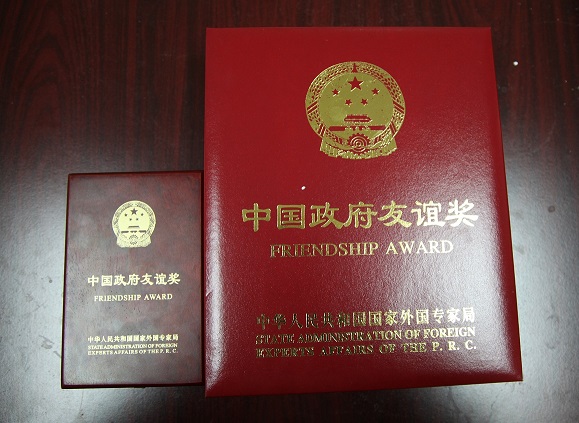In the years since 1986, when Dr. VanderZaag first arrived to lead CIP’s potato program in China, funds have been raised, training offered and potato genetic resources secured for at least seven critical research projects. As a result of these ongoing efforts by Dr. VanderZaag and his CIP colleagues in China, the country’s potato crop yields have skyrocketed and the crop’s popularity soared among Chinese farmers and consumers alike. Of particular note is Cooperation 88, a CIP potato variety that now grows on more than 400,000 hectares in Southwest China and has substantially boosted China’s Gross Domestic Product by its resistance to blight and its excellent quality and appearance. Today China is the largest potato-producing country in the world.
Last month, in recognition of his years of leadership, Dr. VanderZaag was one of 100 foreign experts to receive China’s prestigious Friendship Awards. The award is the nation’s highest honor for achievement by a non-Chinese for outstanding contributions to China’s economic and social progress.
With Chinese Premier Li Keqiang presiding, Dr. VanderZaag and others from 25 countries participated in the Friendship Award ceremony in Beijing’s Great Hall of the People. Peter was not able to attend the ceremony in the Great Hall of the People but accepted his award in person in late October at Yunnan Normal University. His work in 16 provinces across the country on both potato and sweetpotato as well as his close collaboration with Chinese partners, including his counterpart Song Bofu, were honored that evening.
“As a child [in the early 60s], my mother ingrained in me the need to eat all the food on my plate,” said Dr. VanderZaag in remarks he gave at the ceremony. “Why? She reminded me that in China, children like me did not have enough food to eat. You know the history of that time in China. I thought to myself that I should dig a tunnel from Canada through the earth and share my food with hungry Chinese children.
“That,” he added, “was my simple 10-year-old’s solution!”
In the wake of China’s “open door policy,” launched in the early 1980s, the impact of Dr. VanderZaag’s work on new generations of scientists and farmers is far-reaching. For one thing, several of his former students are now leaders in China’s potato program and other areas of government. In 2011, addressing the Chinese Potato Congress in Yinchuan, he described how satisfying teaching and collaborating with young Chinese scientists has been in his career. Over the years, Dr. VanderZaag has guided six graduate students at the Master’s level at The University of the Philippines and Yunnan Normal University; co-advised numerous graduate students at other universities and the Chinese Academy of Agricultural Sciences (CAAS); and created a way for at least two Chinese scholars to obtain their doctorates abroad.
Dr. VanderZaag served as the Secretary General of the Asian Potato Association; its second Triennial Congress, held in Kunming in 1988, drew some 200 potato scientists from 56 nations to share findings. Moreover, he has served either as CIP’s Board of Trustees chair or member in recent years. In that capacity, he helped create the CIP-China Center for Asia and Pacific (CCCAP), which promises to further solidify China’s role in the global potato research and production community. All told, his solid and successful work in China laid an excellent and critical foundation which was a contributing factor to the establishment of CCCAP.

Dr. VanderZaag was one of the 100 foreign experts to receive The People’s Republic of China’s prestigious Friendship Award
